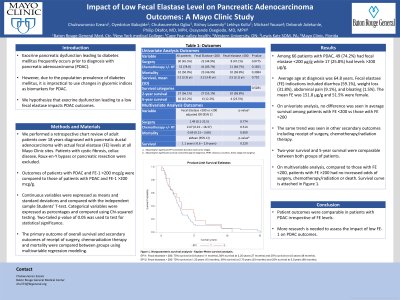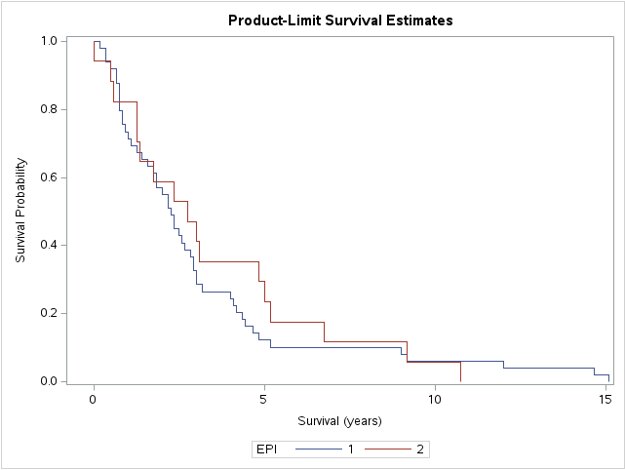Tuesday Poster Session
Category: Biliary/Pancreas
P3470 - Impact of Low Fecal Elastase Level on Pancreatic Adenocarcinoma Outcomes: A Mayo Clinic Study
Tuesday, October 29, 2024
10:30 AM - 4:00 PM ET
Location: Exhibit Hall E


Chukwunonso Ezeani, MBBS
Baton Rouge General Medical Center
Baton Rouge, LA
Presenting Author(s)
Chukwunonso Ezeani, MBBS1, Oyedotun Babajide, MD2, Chukwuemeka E. Ogbu, MD, MPH3, Tayyaba Bhatti, MD4, Michael Youssef, MD5, Lekhya Kollu, MD6, Deborah Adekunle, MD7, Philip Okafor, MD, MPH8, Osayande Osagiede, MBBS, MPH8
1Baton Rouge General Medical Center, Baton Rouge, LA; 2New York Medical College Metropolitan Hospital, New York, NY; 3Cape Fear Valley Health, Fayetteville, NC; 4Western University, London, ON, Canada; 5University of Toronto, Ontario, ON, Canada; 6Lewis Katz School of Medicine at Temple University, Philadelphia, PA; 7Washington University School of Medicine in St. Louis / Barnes-Jewish Hospital, St. Louis, MO; 8Mayo Clinic, Jacksonville, FL
Introduction: Exocrine pancreatic dysfunction leading to diabetes mellitus (DM) frequently occurs prior to diagnosis with pancreatic adenocarcinoma (PDAC). However, due to population prevalence of DM, it is impractical to use changes in glycemic indices as biomarkers for PDAC. We hypothesize that exocrine dysfunction leading to a low fecal elastase impacts PDAC outcomes.
Methods: We performed a retrospective chart review of patients over 18 years diagnosed with PDAC with actual fecal elastase (FE) levels at all Mayo clinic sites. Patients with cystic fibrosis, celiac disease, Roux-en-Y bypass or pancreatic resection were excluded. Outcomes of patients with PDAC and FE-1 < 200 mcg/g were compared to those of patients with PDAC and FE-1 >200 mcg/g. Continuous variables were expressed as means and standard deviations and compared with the independent sample Students' T-test. Categorical variables were expressed as percentages and compared using Chi-squared testing. Two-tailed p-value of 0.05 was used to test for statistical significance. The primary outcome of overall survival and secondary outcomes of receipt of surgery, chemoradiation therapy and mortality were compared between groups using multivariable regression modeling.
Results: Among 66 PDAC patients, 49 (74.2%) had fecal elastase < 200 μg/g while 17 (25.8%) had levels >200 μg/g. Average age at diagnosis was 64.8 years. Fecal elastase (FE) indications included diarrhea (59.1%), weight loss (31.8%), abdominal pain (9.1%), and bloating (1.5%). The mean FE was 151.8 μg/g and 51.5% were female. On univariate analysis, no difference was seen in average survival among patients with FE < 200 vs those with FE >200 (3.2 years vs. 3.5 years, p=0.71). The same trend was seen in other secondary outcomes including receipt of surgery (44.9% vs. 47.1%, p=0.88), chemotherapy/radiation therapy (83.7% vs. 64.7%, p=0.16). Two-year survival and 5-year survival were comparable between both groups of patients p=0.52). On multivariable analysis, compared to those with FE< 200, patients with FE >200 had no increased odds of surgery (adjusted odds ratio [aOR]=1.49,p=0.774) , chemotherapy/radiation (aOR 2.07, 95% confidence interval 0.23-18.37, p=0.5) or death (AOR 0.69, 95% CI 0.13-3.68, P=0.66). Survival curve is attached in Figure 1.
Discussion: Patients with PDAC and FE-1 >200 mcg/g may have longer survival compared with those with FE-1 < 200 mcg/g but this did not meet statistical significance. More research is needed to assess the impact of low FE-1 on PDAC outcomes.

Note: The table for this abstract can be viewed in the ePoster Gallery section of the ACG 2024 ePoster Site or in The American Journal of Gastroenterology's abstract supplement issue, both of which will be available starting October 27, 2024.
Disclosures:
Chukwunonso Ezeani, MBBS1, Oyedotun Babajide, MD2, Chukwuemeka E. Ogbu, MD, MPH3, Tayyaba Bhatti, MD4, Michael Youssef, MD5, Lekhya Kollu, MD6, Deborah Adekunle, MD7, Philip Okafor, MD, MPH8, Osayande Osagiede, MBBS, MPH8. P3470 - Impact of Low Fecal Elastase Level on Pancreatic Adenocarcinoma Outcomes: A Mayo Clinic Study, ACG 2024 Annual Scientific Meeting Abstracts. Philadelphia, PA: American College of Gastroenterology.
1Baton Rouge General Medical Center, Baton Rouge, LA; 2New York Medical College Metropolitan Hospital, New York, NY; 3Cape Fear Valley Health, Fayetteville, NC; 4Western University, London, ON, Canada; 5University of Toronto, Ontario, ON, Canada; 6Lewis Katz School of Medicine at Temple University, Philadelphia, PA; 7Washington University School of Medicine in St. Louis / Barnes-Jewish Hospital, St. Louis, MO; 8Mayo Clinic, Jacksonville, FL
Introduction: Exocrine pancreatic dysfunction leading to diabetes mellitus (DM) frequently occurs prior to diagnosis with pancreatic adenocarcinoma (PDAC). However, due to population prevalence of DM, it is impractical to use changes in glycemic indices as biomarkers for PDAC. We hypothesize that exocrine dysfunction leading to a low fecal elastase impacts PDAC outcomes.
Methods: We performed a retrospective chart review of patients over 18 years diagnosed with PDAC with actual fecal elastase (FE) levels at all Mayo clinic sites. Patients with cystic fibrosis, celiac disease, Roux-en-Y bypass or pancreatic resection were excluded. Outcomes of patients with PDAC and FE-1 < 200 mcg/g were compared to those of patients with PDAC and FE-1 >200 mcg/g. Continuous variables were expressed as means and standard deviations and compared with the independent sample Students' T-test. Categorical variables were expressed as percentages and compared using Chi-squared testing. Two-tailed p-value of 0.05 was used to test for statistical significance. The primary outcome of overall survival and secondary outcomes of receipt of surgery, chemoradiation therapy and mortality were compared between groups using multivariable regression modeling.
Results: Among 66 PDAC patients, 49 (74.2%) had fecal elastase < 200 μg/g while 17 (25.8%) had levels >200 μg/g. Average age at diagnosis was 64.8 years. Fecal elastase (FE) indications included diarrhea (59.1%), weight loss (31.8%), abdominal pain (9.1%), and bloating (1.5%). The mean FE was 151.8 μg/g and 51.5% were female. On univariate analysis, no difference was seen in average survival among patients with FE < 200 vs those with FE >200 (3.2 years vs. 3.5 years, p=0.71). The same trend was seen in other secondary outcomes including receipt of surgery (44.9% vs. 47.1%, p=0.88), chemotherapy/radiation therapy (83.7% vs. 64.7%, p=0.16). Two-year survival and 5-year survival were comparable between both groups of patients p=0.52). On multivariable analysis, compared to those with FE< 200, patients with FE >200 had no increased odds of surgery (adjusted odds ratio [aOR]=1.49,p=0.774) , chemotherapy/radiation (aOR 2.07, 95% confidence interval 0.23-18.37, p=0.5) or death (AOR 0.69, 95% CI 0.13-3.68, P=0.66). Survival curve is attached in Figure 1.
Discussion: Patients with PDAC and FE-1 >200 mcg/g may have longer survival compared with those with FE-1 < 200 mcg/g but this did not meet statistical significance. More research is needed to assess the impact of low FE-1 on PDAC outcomes.

Figure: Nonparametric survival analysis - Kaplan-Meier survival analysis.
EPI 1: Fecal elastase < 200: 75% survival at 0.9 years (11 months), 50% survival at 2.25 years (27 months) and 25% survival at 4.0 years (48 months).
EPI 2: Fecal elastase > 200: 75% survival at 1.25 years (15 months), 50% survival at 2.75 years (33 months) and 25% survival at 5.0 years (60 months).
EPI 1: Fecal elastase < 200: 75% survival at 0.9 years (11 months), 50% survival at 2.25 years (27 months) and 25% survival at 4.0 years (48 months).
EPI 2: Fecal elastase > 200: 75% survival at 1.25 years (15 months), 50% survival at 2.75 years (33 months) and 25% survival at 5.0 years (60 months).
Note: The table for this abstract can be viewed in the ePoster Gallery section of the ACG 2024 ePoster Site or in The American Journal of Gastroenterology's abstract supplement issue, both of which will be available starting October 27, 2024.
Disclosures:
Chukwunonso Ezeani indicated no relevant financial relationships.
Oyedotun Babajide indicated no relevant financial relationships.
Chukwuemeka Ogbu indicated no relevant financial relationships.
Tayyaba Bhatti indicated no relevant financial relationships.
Michael Youssef indicated no relevant financial relationships.
Lekhya Kollu indicated no relevant financial relationships.
Deborah Adekunle indicated no relevant financial relationships.
Philip Okafor indicated no relevant financial relationships.
Osayande Osagiede indicated no relevant financial relationships.
Chukwunonso Ezeani, MBBS1, Oyedotun Babajide, MD2, Chukwuemeka E. Ogbu, MD, MPH3, Tayyaba Bhatti, MD4, Michael Youssef, MD5, Lekhya Kollu, MD6, Deborah Adekunle, MD7, Philip Okafor, MD, MPH8, Osayande Osagiede, MBBS, MPH8. P3470 - Impact of Low Fecal Elastase Level on Pancreatic Adenocarcinoma Outcomes: A Mayo Clinic Study, ACG 2024 Annual Scientific Meeting Abstracts. Philadelphia, PA: American College of Gastroenterology.
